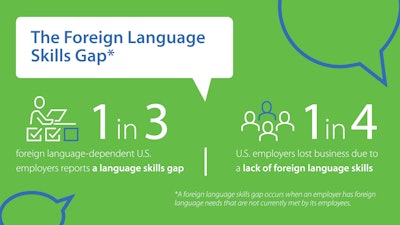
U.S. employers are drowning in a foreign language skills gap that affects day-to-day business and the bottom line. The American Council on the Teaching of Foreign Languages (ACTFL) recently conducted a survey of 1,200 U.S. employers and uncovered that language skills are in high demand across industries and functions — and that demand is expected to rise. ACTFL published the survey results in its report "Making Languages Our Business: Addressing Foreign Language Demand Among U.S. Employers." The report surveyed employers in construction, manufacturing, hospitality and travel, professional and technical services, healthcare and social assistance, education services, trade, and others.
According to the survey, one in three employers reports a foreign language skills gap and more than half of respondents expect foreign language demand will increase in the next five years.
Read Next: Are Agroterrorists Guarding the Hen House?
Other findings include:
- Nine out of 10 U.S. employers rely on employees with language skills other than English because the employer does not have the skills
- 56% of survey respondents say foreign language demand will increase in the next five years
- 47% state a need for language skills exclusively for the domestic market
- One in four U.S. employers lost business due to a lack of language skills
That last finding is significant. It's not just co-worker communication that is affected by the language gap. Employers, even those who do not feel their company has a foreign language gap, are losing business or unable to pursue a business opportunity due to a lack of foreign language skills. In today's business environment, employers can't rely on their customers', suppliers' and partners' abilities to speak English. Companies don't just need to focus on closing the language gap between internal workers, but they also need to think about the people they interact with and depend on outside of their company walls. If you can't communicate to and with a customer (or a driver) who speaks a foreign language then you're losing out on business.
Having foreign language skills is no longer just a benefit for job communication and safety, it's becoming a necessity to do business. And it's not just management that needs to improve their foreign language skills. Think about your workers who interact with customers and others in the supply chain on a more frequent basis. If they don't have the language skills to speak with the other sectors of the supply chain it can negatively affect current and future business as well.
 American Council on the Teaching of Foreign Languages (ACTFL)
American Council on the Teaching of Foreign Languages (ACTFL)
If you work with exporters, then your business is even more reliant on foreign language skills. According to the ACTFL report, companies working with exporters are almost 60% more likely to have a shortage of foreign language skills and more than twice as likely to lose business because of insufficient foreign language capacity.
According to the report, Spanish is the most in-demand foreign language for all industries. Chinese, French, Japanese and German round out the top five. But for an industry like the supply chain, your company may encounter all these languages.
 American Council on the Teaching of Foreign Languages (ACTFL)
American Council on the Teaching of Foreign Languages (ACTFL)
ACTFL makes seven recommendations U.S. businesses should employ to improve their foreign language skills gap.
- Conduct a Language Needs Analysis to identify strengths and weaknesses and define current and future language needs.
- Conduct outside language testing and assessment to identify linguistic strengths and weaknesses.
- Maintain an inventory of linguistic and cultural competencies of your workforce.
- Make foreign languages a strategic focus during the recruitment process.
- Train employees who lack the required level of language proficiency.
- Identify and cultivate a pipeline of multilingual talent by partnering with surrounding colleges and universities with international studies, foreign language and study abroad programs.
- Advocate policies that are responsive to industry foreign language and workforce needs.












